高一英语必修二 Unit1语法课件
合集下载
人教版高一英语必修二Unit 1课文课件(共76张PPT)
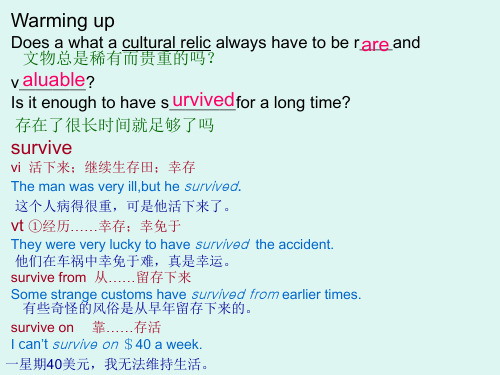
如:
The job was very difficult, which took the workers ten months to do. 这项工作十分困难,它花费了工人们十 个月的时间。
It took me quite a long time to understand the meaning of the painting. 我花了相当长的时间才理解了那幅画的 意义。
The wedding car is decorated with flowers and ballons.
婚车用花和气球装饰着。
decorate sth in /after…style按照……风格装饰
The house is decorated in western style . 房子采用西式装饰。
的 经 验 介 绍 ,特别是 昨天看 了我们 威海市
C. in search of D. looked for
(2). Many farmers go into towns and cities in
search_o_f__ good jobs and higher pay.
(3). Many people joined them in the search _f_o_r_ gold.
被选择的琥珀色彩艳丽呈黄褐色,像蜜一样。
a beautiful yellow-brown color like h_o_n_e_y__蜂蜜 . The ⑹d_e_s_ig_n 设计 of the room was in the ⑺ f_a_n_c_y_ 设想;爱好 ⑻s_t_y_le 风格 popular in those days .
这件礼物就是琥珀屋,它之所以有这个名字,是因为造这间房子用了近几 吨琥珀,
高一英语必修二Unit1-Language-points课件-PPT

7. Although it feels as hard as stone , it easily melts when heated .
when heated = when it is heated , 省略 了“主语+be”,这种省略句省略的主语 应与主句的主语相同。
8. be made into 被制成… be made of 用…制成(看得见原材料) be made from 用…制成(看不见原材料) be made for 为…制作 be made up of 由…组成 Ex. 用以上短语完成句子。 1). A car __is__m_a_d_e__u_p__o_f ___many different parts . 2). The chair __i_s_m__a_d_e_o_f____wood . 3). The wine ___i_s_m__a_d_e_f_r_o_m___grapes . 4). The salad _is_m__a_d_e__o_f lettuce , tomatoes and cucumbers . 5). Wood can _b_e__m__a_d_e_i_n_to_paper .
瞧;看 看起来像 寻找 上下仔细打量某人 照顾 期盼做某事 调查;向里面看 当心 环顾四周 查字典,向上看
4. insist
insist on/upon sth/ doing 坚持做,坚决做
insist that-clause 坚持认为, 坚持 说… 从句通常用虚拟语气, (should) not +V 原 而且主句的主语与从句的不一致
agree to
I ___________what you said.
agree with
2019外研版高中英语选择性必修二Unit1 单元语法详解课件
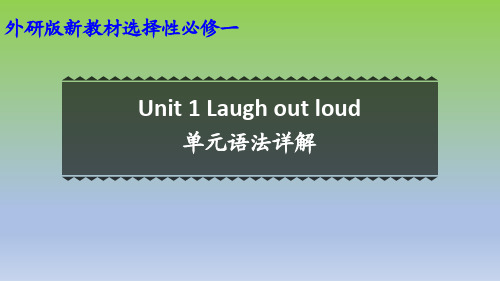
e. We are specially trained clowns who work as part of a program
known as “hospital clowning”. (教材 P3).
f. We have to be very sensitive and work closely with the doctors and
● 温馨提示:主句是疑问句时,首先要确定定语从先行词, 方法是将疑问句恢复成肯定句,然后进行辨别确认, 请观察 以下句子
a. Is this the factory __(_t_h_a_t_/w__h_ic_h_)__ we visited last week?
※肯定句:This is the factory(_th_a_t_/_w__h_ic_h)we visited last week.
rushed her to the hospital after she fell off her bicycle. (教材 P51)
d. Scientific studies show that laughter produces chemicals to make
people fee better, which means clown doctors can be helpful. (教材 P2)
b. Is this factory _t_h_e__o_n_e__(t_h_a_t_) we visited last week?
※肯定句:This factory is _th__e_o_n_e__(t_h_a_t) we visited last week?
c. Is this the factory ____w_h__e_re____ his father works?
known as “hospital clowning”. (教材 P3).
f. We have to be very sensitive and work closely with the doctors and
● 温馨提示:主句是疑问句时,首先要确定定语从先行词, 方法是将疑问句恢复成肯定句,然后进行辨别确认, 请观察 以下句子
a. Is this the factory __(_t_h_a_t_/w__h_ic_h_)__ we visited last week?
※肯定句:This is the factory(_th_a_t_/_w__h_ic_h)we visited last week.
rushed her to the hospital after she fell off her bicycle. (教材 P51)
d. Scientific studies show that laughter produces chemicals to make
people fee better, which means clown doctors can be helpful. (教材 P2)
b. Is this factory _t_h_e__o_n_e__(t_h_a_t_) we visited last week?
※肯定句:This factory is _th__e_o_n_e__(t_h_a_t) we visited last week?
c. Is this the factory ____w_h__e_re____ his father works?
高中一年级英语必修二Unit1语法课件

B.
I will never forget the days when we spent our holidays together.
I will never forget the days that / which we spent together.
C.
This is the reason why he was dismissed.
定语从句归纳总结 一、定语从句的定义:
用来修饰名词或代词的从句叫定语从 句。被定语从句所修饰的名词或代词叫先行 词(antecedent)。定语从句一般是由关系 代词或关系副词来引导的。相当于名词和形 容词的作用。
eg: 1. Do you know the man who came to see Xiao Yang this morning?
1. The man who / that lives next door is a writer. 2.The woman who / whom / that/- I visited last week is a famous writer. 3. Beijing is the city which / that has got the chance to host the 2008
• 在这时as可以在句首, which 不可以; as 有正如的意思, 而which 没有。
八、限制性定语从句和非限制性定语从句
1.限制性定语从句是先行词在意义上不可缺少的 定语,如果去掉,主句的意思就不完整或失去意义。 这种从句和主句的关系十分密切,写时不用逗号分 开。限制性定语从句中作宾语的关系代词常可省略。
(3) 在非限定性定语从句中必须用which不能 用that。
They have invited me to visit their country, which is very kind of them.
必修2第1单元语法 高中英语必修课件
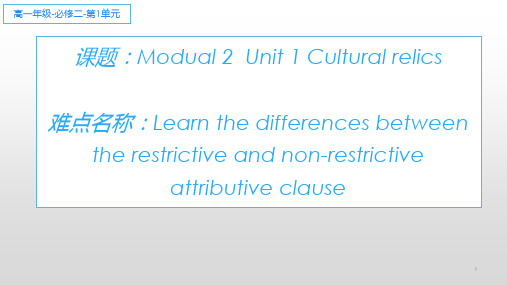
Realizing his parents' love, Nezha doesn't give in to his fate (命运) which/that may destroy him. Instead, he makes a change of himself and gains a new life.
高一年级-必修二-第1单元
课题:Modual 2 Unit 1 Cultural relics
难点名称:Learn the differences between
the restrictive and non-restrictive attributive clause
1
目录
CONTENTS
导入
知识讲解
课堂练习 难点巩固
1. How should we deal with judgments(判断)on those who are treated unfairly?
We shouldn't make judgments which are just based on others' ideas. Instead, we should try to see the truth that is behind the appearance to avoid(以免) treating someone wrongly.
知识讲解 Learn the differences between the restrictive and non-restrictive attributive clause
难点突破
A: Nezha always makes trouble that/which causes the villagers' misunderstanding.
高一年级-必修二-第1单元
课题:Modual 2 Unit 1 Cultural relics
难点名称:Learn the differences between
the restrictive and non-restrictive attributive clause
1
目录
CONTENTS
导入
知识讲解
课堂练习 难点巩固
1. How should we deal with judgments(判断)on those who are treated unfairly?
We shouldn't make judgments which are just based on others' ideas. Instead, we should try to see the truth that is behind the appearance to avoid(以免) treating someone wrongly.
知识讲解 Learn the differences between the restrictive and non-restrictive attributive clause
难点突破
A: Nezha always makes trouble that/which causes the villagers' misunderstanding.
高中英语人教版必修二unit 1 language points 课件
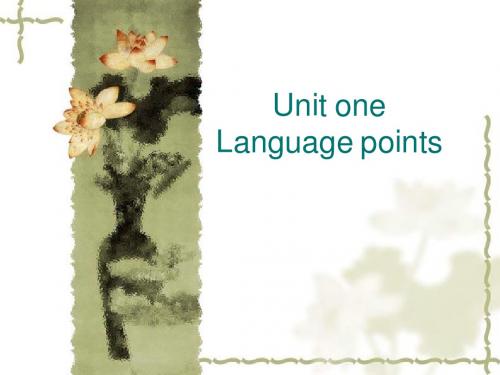
Para 2 1. 为……设计 2. 属于 3. 作为回报 4. 一队士兵 5. 成为沙皇冬宫的一部分 6. 被用做 7. 一个接待厅 Para 4; 5 1. 这是两国交战时期 2. 搬走一些家具 3. 不超过,少于 4. 木箱 5. 毫无疑问 6. 成了一个谜 7. 庆祝 8. 值得重建
Para 1 1 文化遗产 cultural relics 2 寻找 in search (n.) of
Para 2
1 为……设计 design… for
2 属于
belong to (无被动)
in return
3 作为回报
4 一队士兵
a troop of soldiers
5 成为沙皇冬宫的一部分
become part of the Czar’s Winter Palace
6 被用做 serve as (无被动); be used as
Fancy:“奇特的” (1) adj. 奇特的,异样的 She always likes to wear fancy clothes. 她总喜欢 穿奇装异服。 (2) vt. 想象,设想 He sometimes fancied that he heard strange sounds. 他有时想象自己听到了奇怪的声音。 (3) vt. 喜欢,爱好,想要 I don’t fancy staying in tonight. 我今晚不想呆在家 里。 【注意】 fancy用作“想象,爱好”解时,后面作 宾语的可以是名词、V-ing形式或者that从句。 【常见搭配】 fancy dress party 化装舞会;take a fancy to 喜欢,爱上;take / catch one‘s fancy 合某 人的心意,吸引某人。
人教版高中英语必修2unit1课文知识点详解ppt课件

She fancied herself (as/to be)a serious actress.
精选ppt课件
14
3.design
It was designed for the palace of Frederick
Ⅰ. 观察思考
(回归课本P1)
The basic design of the car is very similar
中。
考点提炼 该句使用了have sth.done结构,其 中过去分词在句中作宾语补足语,表示被动的含
义。
get sth.done可替换have sth.done表达相同的意
思。该结构字面的意思是“使某事被做 ”,有时
可翻译成“请人做某事 ”,有时也可能是自己做
某事,有时have还有“精选遭ppt遇课件,遭受”之意。
6
3.This was a time when the two countries were
at war.当时正处于两国交战的时期。
考点提炼 This is/was a time when...意为
“ 这是一个……的时期/时候 ”。其中when引 导的是定语从句,修饰先行词a time。
4.There is no doubt that the boxes were then
3.We use flowers and balloons to decorate our
classroom on New Year’s Day.
精选ppt课件
1
4.Illegally parked cars will be removed by traffic police.
5.The broken ship sank to the bottom of the sea.
精选ppt课件
14
3.design
It was designed for the palace of Frederick
Ⅰ. 观察思考
(回归课本P1)
The basic design of the car is very similar
中。
考点提炼 该句使用了have sth.done结构,其 中过去分词在句中作宾语补足语,表示被动的含
义。
get sth.done可替换have sth.done表达相同的意
思。该结构字面的意思是“使某事被做 ”,有时
可翻译成“请人做某事 ”,有时也可能是自己做
某事,有时have还有“精选遭ppt遇课件,遭受”之意。
6
3.This was a time when the two countries were
at war.当时正处于两国交战的时期。
考点提炼 This is/was a time when...意为
“ 这是一个……的时期/时候 ”。其中when引 导的是定语从句,修饰先行词a time。
4.There is no doubt that the boxes were then
3.We use flowers and balloons to decorate our
classroom on New Year’s Day.
精选ppt课件
1
4.Illegally parked cars will be removed by traffic police.
5.The broken ship sank to the bottom of the sea.
人教版高中英语必修二Unit1.PPT课件

• [答案] survivors survived;survival
4.design n.设计;图案;构思 vt.设计;计划;构思 [教材原句]The design of the room was in the fancy style popular in those days.(P1)房间的设计是当时流行的风格。
• Ⅱ.联想填读 • 1.in__________寻找→search__________寻找 • [答案] search of;for • 2.__________n. & vt.设计→be__________...为……而设计 • [答案] design;designed for • 3.__________________作为回报→______________作为对……的回报
• 用valuable和value填空 • ①Don't lose this ring—It's of great __________. • [答案] value • ②The necklace is attractive but not very __________. • [答案] valuable
__________(值) 800 yuan.
• [答案] doubt;worth
1.rare adj.(P1)稀罕的;稀有的,珍贵的 (rarely adv.很少; 难得;几乎不)
[一句背诵] Rarely do we hear about such a rare and valuable metal.我们很少听说有这样稀有并有价值的金属。
Cultural
relics
CONTENTS
-
1.识记填读 2.联想填读 3.构词填读 4.语境填读 5.句式填读 6.核心词汇 7.单元语法 8.微型考场 9.名师讲坛
4.design n.设计;图案;构思 vt.设计;计划;构思 [教材原句]The design of the room was in the fancy style popular in those days.(P1)房间的设计是当时流行的风格。
• Ⅱ.联想填读 • 1.in__________寻找→search__________寻找 • [答案] search of;for • 2.__________n. & vt.设计→be__________...为……而设计 • [答案] design;designed for • 3.__________________作为回报→______________作为对……的回报
• 用valuable和value填空 • ①Don't lose this ring—It's of great __________. • [答案] value • ②The necklace is attractive but not very __________. • [答案] valuable
__________(值) 800 yuan.
• [答案] doubt;worth
1.rare adj.(P1)稀罕的;稀有的,珍贵的 (rarely adv.很少; 难得;几乎不)
[一句背诵] Rarely do we hear about such a rare and valuable metal.我们很少听说有这样稀有并有价值的金属。
Cultural
relics
CONTENTS
-
1.识记填读 2.联想填读 3.构词填读 4.语境填读 5.句式填读 6.核心词汇 7.单元语法 8.微型考场 9.名师讲坛
人教版高中英语必修二第一单元语法课件-非限制性定语从句

Book 2 Unit 1 Grammar The Restrictive and Non-restrictive Attributive Clauses
By Wendy Enping No. 1 Middle School
Teaching aims: 1. Revise what we have learned in Book 1 Unit 4 and Unit 5; 2. Master the Restrictive Attributive Clauses and the Non-restrictive Attributive Clauses and tell the differences between them; 3. Application of the Non-Restrictive Attributive Clauses.
限制性定语从句 形式上 意义上 作用上 翻译时 关系词 非限制性定语从句
不用逗号
去掉后句意不完整
用逗号 去掉后,句意完整 补充说明
可修饰先行词或主句
修饰限制
只可修饰先行词
译为“……的”
可译为并列句
作宾语时可以省略
不可省略且不能用 that , why 引导
Let’s have a try(5’) 1. China, _____ was founded in 1949, is becoming more and more powerful. 2. He was late again, _____ made his teacher unhappy. 3. His mother, _____ loves him very much, is strict with him. 4. Sun Yida, _____ everyone likes very much, is one of the best athletes in our class. 5. Angles, _____ native language is German, can read and write in several foreign languages. 6. The play, _____ style is informal, is popular with the young people. 7. They went to London, _____ they lived for six months. 8. He will put off the picnic until May 1st, _____ he will be free. 9. Last summer I visited the People’s Great Hall, _____ many important meetings are held every year. 10. I had told them the reason, for _____ I didn’t attend the meeting.
By Wendy Enping No. 1 Middle School
Teaching aims: 1. Revise what we have learned in Book 1 Unit 4 and Unit 5; 2. Master the Restrictive Attributive Clauses and the Non-restrictive Attributive Clauses and tell the differences between them; 3. Application of the Non-Restrictive Attributive Clauses.
限制性定语从句 形式上 意义上 作用上 翻译时 关系词 非限制性定语从句
不用逗号
去掉后句意不完整
用逗号 去掉后,句意完整 补充说明
可修饰先行词或主句
修饰限制
只可修饰先行词
译为“……的”
可译为并列句
作宾语时可以省略
不可省略且不能用 that , why 引导
Let’s have a try(5’) 1. China, _____ was founded in 1949, is becoming more and more powerful. 2. He was late again, _____ made his teacher unhappy. 3. His mother, _____ loves him very much, is strict with him. 4. Sun Yida, _____ everyone likes very much, is one of the best athletes in our class. 5. Angles, _____ native language is German, can read and write in several foreign languages. 6. The play, _____ style is informal, is popular with the young people. 7. They went to London, _____ they lived for six months. 8. He will put off the picnic until May 1st, _____ he will be free. 9. Last summer I visited the People’s Great Hall, _____ many important meetings are held every year. 10. I had told them the reason, for _____ I didn’t attend the meeting.
高中英语必修二Unit1教学课件

Unit 1 Cultural relics
Warming Up – I ( 6m )
Look at the three groups of pictures and discuss these questions. 1. Do you know these places? 2. If you know, what do you know about the places? 3. Which one would you like to visit? Why?
3 How did the Amber Room become one of the
world?
wonders of the
4 How did the Amber Room get lost?
5 How was a new Amber room built?
1 How was the Amber Room made?
Join the correct parts of the sentences together.
1.Frederick Ⅰ 2.Frederick William Ⅰ 3.Peter the Great 4.Catherine Ⅱ 5.The Nazi army 6.The Russian and Germans
Reading -- III Answering questions ( 5m )
Read the text again and answer the following questions(discuss in pairs):
1.What was given to the Russian people as a great gift by Frederick William I ,the king of Prussia?
Warming Up – I ( 6m )
Look at the three groups of pictures and discuss these questions. 1. Do you know these places? 2. If you know, what do you know about the places? 3. Which one would you like to visit? Why?
3 How did the Amber Room become one of the
world?
wonders of the
4 How did the Amber Room get lost?
5 How was a new Amber room built?
1 How was the Amber Room made?
Join the correct parts of the sentences together.
1.Frederick Ⅰ 2.Frederick William Ⅰ 3.Peter the Great 4.Catherine Ⅱ 5.The Nazi army 6.The Russian and Germans
Reading -- III Answering questions ( 5m )
Read the text again and answer the following questions(discuss in pairs):
1.What was given to the Russian people as a great gift by Frederick William I ,the king of Prussia?
上外版2020高中英语必修第二册unit 1单元语法课件(定语从句之关系代词关系副词用法)
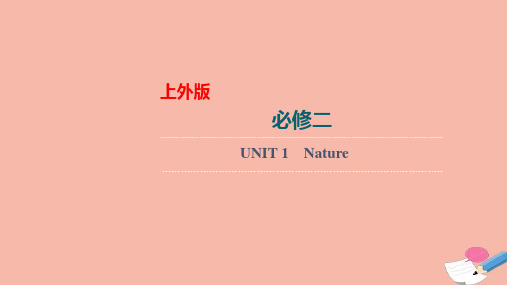
when/on which
It was an age ____ we had no phones.
when
先行词为抽象时间: age(年代);occasion(机会场合);interval(间隔); stay(逗留时间)
where 指地点(=介词+which)
Lin tong is a very beautiful place ____ archaeologist found the Terracotta Warriors
every age group.
定语从句中的术语
先行词 关系词
关系代词 关系副词
了解定语从句(一) -关系代词
关系代词
who/ whom/that which/ that whose as
关系词在从句中的成分
1. He is the man who/that teaches us English. 2. He is the teacher who/that/whom we want to visit. 3. This is an interesting book which/that he gave me. 4. The glory king is a game which/that is suitable for
➢ 当先行词被so, such, the same修饰时,此时关 系代词用as引导且不能省略。
The city was attacked by ____su_ch___ terrible
weather ____as_____ few citizens had ever
experienced before.
He is such a kind man _____all of us like him.
It was an age ____ we had no phones.
when
先行词为抽象时间: age(年代);occasion(机会场合);interval(间隔); stay(逗留时间)
where 指地点(=介词+which)
Lin tong is a very beautiful place ____ archaeologist found the Terracotta Warriors
every age group.
定语从句中的术语
先行词 关系词
关系代词 关系副词
了解定语从句(一) -关系代词
关系代词
who/ whom/that which/ that whose as
关系词在从句中的成分
1. He is the man who/that teaches us English. 2. He is the teacher who/that/whom we want to visit. 3. This is an interesting book which/that he gave me. 4. The glory king is a game which/that is suitable for
➢ 当先行词被so, such, the same修饰时,此时关 系代词用as引导且不能省略。
The city was attacked by ____su_ch___ terrible
weather ____as_____ few citizens had ever
experienced before.
He is such a kind man _____all of us like him.
高一英语必修二_unit1_单词用法 PPT

We decorate the Christmas tree with flowers. ②授予(某人)殊荣
be decorated for… 因······而获得殊荣
e.g 他因勇敢地与敌人斗争而获得荣誉 He was decorated for fighting against enemy bravely.
He bought a painting in the style of Picasso. 他买了一副毕加索风格的画。
be in style=be popular 流行的;时髦的 be out of style= be unpopular 过时的;不流行的
decorate vt. ①装饰;装修
decorate A with B 用B装饰A e.g 我们用鲜花装饰圣诞树。
e.g 你应该规划你的未来。 You should make design for your future.
2. v. 设计;计划;构思
v.
be designed for 为······而打算/设计 be designed to do 目的是做······
e.g 这个项目目的是帮助老人。
This project is designed to help old people.
decoration n. 装饰品;奖章
Exercise:
On my eighth birthday I received a pencil box__B__ with some cartoon pictures on the top.
A. decorating
B. decorated
C. to decorate
Rarely have I seen such a beautiful sunset.
be decorated for… 因······而获得殊荣
e.g 他因勇敢地与敌人斗争而获得荣誉 He was decorated for fighting against enemy bravely.
He bought a painting in the style of Picasso. 他买了一副毕加索风格的画。
be in style=be popular 流行的;时髦的 be out of style= be unpopular 过时的;不流行的
decorate vt. ①装饰;装修
decorate A with B 用B装饰A e.g 我们用鲜花装饰圣诞树。
e.g 你应该规划你的未来。 You should make design for your future.
2. v. 设计;计划;构思
v.
be designed for 为······而打算/设计 be designed to do 目的是做······
e.g 这个项目目的是帮助老人。
This project is designed to help old people.
decoration n. 装饰品;奖章
Exercise:
On my eighth birthday I received a pencil box__B__ with some cartoon pictures on the top.
A. decorating
B. decorated
C. to decorate
Rarely have I seen such a beautiful sunset.
高中人教版必修二Unit1 Cultural relics 语言点讲解课件(共14张)
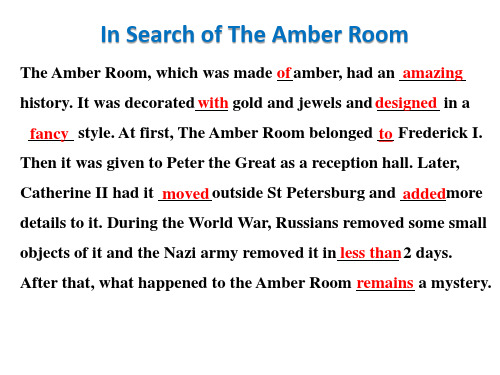
日本曾经企图侵占中国的领土和财富。 Once Japan had designs on the territory and wealth of China. 其实,他早就对王位(crown)有了觊觎之心。 As a matter of fact, he has already had designs on the crown for a long time.
名词为其它,表某事值得一做 ②sth. be worth doing 某事值得一做 (不能用被动)
周杰伦的演唱会门票价值一千元。
The ticket of Jay Chou' concert is worth one thousand.
这个方法似乎值得一试。
It seems as if this way is worth trying/ a try.
13、He who seize the right moment, is the right man.谁把握机遇,谁就心想事成。21.8.2721.8.2723:27:3223:27:32August 27, 2021 • 14、谁要是自己还没有发展培养和教育好,他就不能发展培养和教育别人。2021年8月27日星期五下午11时27分32秒23:27:3221.8.27 • 15、一年之计,莫如树谷;十年之计,莫如树木;终身之计,莫如树人。2021年8月下午11时27分21.8.2723:27August 27, 2021 • 16、教学的目的是培养学生自己学习,自己研究,用自己的头脑来想,用自己的眼睛看,用自己的手来做这种精神。2021年8月27日星期五11时27分32秒23:27:3227 August 2021 • 17、儿童是中心,教育的措施便围绕他们而组织起来。下午11时27分32秒下午11时27分23:27:3221.8.27
名词为其它,表某事值得一做 ②sth. be worth doing 某事值得一做 (不能用被动)
周杰伦的演唱会门票价值一千元。
The ticket of Jay Chou' concert is worth one thousand.
这个方法似乎值得一试。
It seems as if this way is worth trying/ a try.
13、He who seize the right moment, is the right man.谁把握机遇,谁就心想事成。21.8.2721.8.2723:27:3223:27:32August 27, 2021 • 14、谁要是自己还没有发展培养和教育好,他就不能发展培养和教育别人。2021年8月27日星期五下午11时27分32秒23:27:3221.8.27 • 15、一年之计,莫如树谷;十年之计,莫如树木;终身之计,莫如树人。2021年8月下午11时27分21.8.2723:27August 27, 2021 • 16、教学的目的是培养学生自己学习,自己研究,用自己的头脑来想,用自己的眼睛看,用自己的手来做这种精神。2021年8月27日星期五11时27分32秒23:27:3227 August 2021 • 17、儿童是中心,教育的措施便围绕他们而组织起来。下午11时27分32秒下午11时27分23:27:3221.8.27
人教课标版英语必修二Unit1 语法课 课件 (共18张PPT)

Practice who / whom / which / that / whose
Anyone: your parents / friends / teacher /… Anything: your pet / house / books /…
that / which or where
We often pay a visit to places _th_a_t_/w__h_ic_h__ we both show interest in.
angry to control myself as I become the master of my own emotions.
Practice : that/which or when
• I still have vivid memories of the day _______________________________.
This girl _w__h_o_/_th_a_t_ is fond of smiling is my devoted friend, _w_h_o_s_e_ eyes are small, beautiful and shiny. I often spend time chatting with her, with_w__h_o_m_ I can share joys and sorrows. In the past 10 years, she has given me many gifts,one of _w_h_i_c_h_ is my favourate book,_w__h_o_s_e_ cover is quite fine, _w_h_ic_h__shows her love for me.
• The days _____________________will never escape my memory.
高一英语必修二Unit1语法课件

主语 +动词过去式 +其他
用法
例句
用于描述过去发生的动作或情况。
The audience clapped after the performance.
一般将来时
一般将来时用于表示将来的动作或状态。通常使用情态动词will或be goingto。例如:We will visit the museum tomorrow.
高一英语必修二Unit1语 法课件
欢迎来到高一英语必修二的语法课件。在本课件中,我们将介绍一般现在时、 一般过去时、一般将来时、现在进行时、过去进行时以及一般过去时和过去 进行时的区别。
一般现在时
一般现在时是用于表示现在的状态、习惯动作等。它使用动词的原形。例如:I eat lunch at home every day.
1
结构
主语 +was/were +现在分词 +其他
2
用法
用于表示过去某个时间正在进行的动作。
3
例句
She was cooking dinner while he was watching TV.
一般过去时和过去进行时的区别
一般过去时和过去进行时在描述过去的动作或状态时有所不同。一般过去时强调的是动作或状态的完成,而过 去进行时强调正在进行的动作。例如:I played chess when he was watching TV.
结构
主语 +will +动词原形 / be goingto +动词原形 +其他
用法
用于表示打算、预测、意愿、 承诺和预定的动作或情况。
例句
I am going to take the train to t表示现在正在进行的动作。使用be动词的现在分词形式加上动词-ing。例如:She is studying for her exam right now.
用法
例句
用于描述过去发生的动作或情况。
The audience clapped after the performance.
一般将来时
一般将来时用于表示将来的动作或状态。通常使用情态动词will或be goingto。例如:We will visit the museum tomorrow.
高一英语必修二Unit1语 法课件
欢迎来到高一英语必修二的语法课件。在本课件中,我们将介绍一般现在时、 一般过去时、一般将来时、现在进行时、过去进行时以及一般过去时和过去 进行时的区别。
一般现在时
一般现在时是用于表示现在的状态、习惯动作等。它使用动词的原形。例如:I eat lunch at home every day.
1
结构
主语 +was/were +现在分词 +其他
2
用法
用于表示过去某个时间正在进行的动作。
3
例句
She was cooking dinner while he was watching TV.
一般过去时和过去进行时的区别
一般过去时和过去进行时在描述过去的动作或状态时有所不同。一般过去时强调的是动作或状态的完成,而过 去进行时强调正在进行的动作。例如:I played chess when he was watching TV.
结构
主语 +will +动词原形 / be goingto +动词原形 +其他
用法
用于表示打算、预测、意愿、 承诺和预定的动作或情况。
例句
I am going to take the train to t表示现在正在进行的动作。使用be动词的现在分词形式加上动词-ing。例如:She is studying for her exam right now.
高中人教版高中英语必修二unit1_Cultural_relics_(全单元课件)精品ppt课件
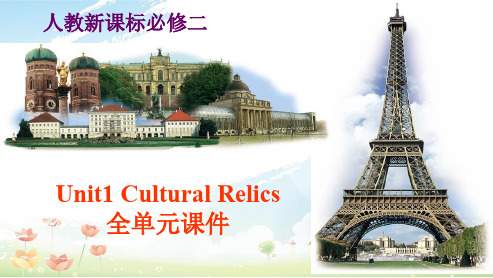
Yes, it is enough to have survived a long time.
3 Are cultural relics only objects like vases or can they be buildings too? Look at the pictures below and discuss what they are and whether they are cultural relics or not.
Raw
Can you imagine what a room made of amber looks like?
amber
What do you think the text may talk about according to the title?
Reading
IN SEARTCH OF THE AMBER ROOM
Year 1716
What happened to the Amber Room
In 1716 , Frederick William I gave the Amber Room to Peter the Great , as a gift of friendship from Prussian to the Russian people.
Length
About 3. ______
4 metres
History of the Amber Room
4. _D_e_s_i_g_n_e_d for the palace of Frederick I. Given to Peter the Great by Frederick William Ⅰand became part of the Czar’s 5. ___________. Mowveidntteorapaplaalcaece outside St Petersburg by CatherineⅡand 6. ____________ were added to it.
3 Are cultural relics only objects like vases or can they be buildings too? Look at the pictures below and discuss what they are and whether they are cultural relics or not.
Raw
Can you imagine what a room made of amber looks like?
amber
What do you think the text may talk about according to the title?
Reading
IN SEARTCH OF THE AMBER ROOM
Year 1716
What happened to the Amber Room
In 1716 , Frederick William I gave the Amber Room to Peter the Great , as a gift of friendship from Prussian to the Russian people.
Length
About 3. ______
4 metres
History of the Amber Room
4. _D_e_s_i_g_n_e_d for the palace of Frederick I. Given to Peter the Great by Frederick William Ⅰand became part of the Czar’s 5. ___________. Mowveidntteorapaplaalcaece outside St Petersburg by CatherineⅡand 6. ____________ were added to it.
高中英语牛津译林版必修第二册 unit1 grammar and usage课件

g a pronoun like everyone h a phrase of measurement like
two hours
11
• When not only … but also … is used as the subject of a sentence, or there be is followed by two or more nouns as the subject of a sentence, the verb agrees with the noun closest to it. Such paired conjunctions include: either…or…; neither…nor…; not…but… eg Not his parents but she doesn’t want to go there. Neither you nor I am right. Not only the students but also the teacher likes this holiday. There is a pen and several pencils in the box.
5
Building the jungle environment on the computer was no easy job. It took more than 800 artists over a year to work on the project. The Jungle Book lasts for about two hours but there is enough tension and humour to hold your attention during the whole film. Two hours seems very short when you’re having so much fun!
two hours
11
• When not only … but also … is used as the subject of a sentence, or there be is followed by two or more nouns as the subject of a sentence, the verb agrees with the noun closest to it. Such paired conjunctions include: either…or…; neither…nor…; not…but… eg Not his parents but she doesn’t want to go there. Neither you nor I am right. Not only the students but also the teacher likes this holiday. There is a pen and several pencils in the box.
5
Building the jungle environment on the computer was no easy job. It took more than 800 artists over a year to work on the project. The Jungle Book lasts for about two hours but there is enough tension and humour to hold your attention during the whole film. Two hours seems very short when you’re having so much fun!
- 1、下载文档前请自行甄别文档内容的完整性,平台不提供额外的编辑、内容补充、找答案等附加服务。
- 2、"仅部分预览"的文档,不可在线预览部分如存在完整性等问题,可反馈申请退款(可完整预览的文档不适用该条件!)。
- 3、如文档侵犯您的权益,请联系客服反馈,我们会尽快为您处理(人工客服工作时间:9:00-18:30)。
Olympic Games. 4. A dictionary is a book which / that/-you can use to learn more words. 5. The little boy whose eyes are blue is holding a dog.
6. The house whoseroof was blown away by the storm will be rebuilt soon.
This is the very book that belongs to him.
(4)当先行词既有人又有物时, 用关系代词that
We were deeply impressed by the teachers and the schools that we had visited there.
Those who are from Qingdao come this way. 2.当先行词是用-body或-one构成的不定代 词时
Is there anybody else who should be invited
关系副词when, where, why的用法
关系副词都等于一个适当的介词+which, 在从句中作状语
(3) 在非限定性定语从句中必须用which不能 用that。
They have invited me to visit their country, which is very kind of them.
that和who在指 人的情况下一般都可以 互换, 但在下列情况下, 一般用who而不用 th1a.t。先行词为those, one, ones, peoples时
When=in/at/on/during…+which;
Where=in/at/on/…+which;
Why=for +which 1.Do you still remember the day when(on which) we went to visit the museum together?
B.
I will never forget the days when we spent our holidays together.
I will never forget the days that / which we spent together.
C.
This is the reason why he was dismissed.
1. The man who / that lives next door is a writer. 2.The woman who / whom / that/- I visited last week is a famous writer. 3. Beijing is the city which / that has got the chance to host the 2008
意大利的首都罗马历史非常悠久。
b) Yesterday I met Professor King, who came from the University of London.
昨天我遇见金教授,他从伦敦大学来的。
c) He lent me a dictionary, which was just what I needed.
as 从句的先行词是the same, such, 或被他们 所修饰;在从句中做主语或宾语;多用于表示 肯定意义的从句中,不用于表否定意义的从句 中。
e.g. Many of the sports are the same as they were when they started.
The result was not such as he expected.
2.The day is not far off when we will make a trip to Britain.
二、关系代词和关系副词的作用:
1、引导作用 2、替代作用 3、在定语从句中担当某个成分的作用
eg: 1.Those who want to go please sign your names here.
2.非限制性定语从句和主句关系不十分密切,只 是对先行词作些附加的说明, 如果去掉, 主句的意 思仍然清楚。这种从句和主句之间往往用逗号分 开,一般不用that引导。非限制性定语从句中,关 系词不可省略。如:
a) Rome, which is the capital of Italy, has a very long history.
I am sure she has something (that) you can borrow. I’ve read all the books that are not mine.
2)先行词被序数词或形容词最高级修饰时。 This is the first book (that) he has read. 3)先行词被the only, the very, the same, the last修饰时
7. I began to work in Beijing in the year __w_h_e_n_New China was founded.
8. Do you know the reason _w__h_yhe didn’t come?
9. I can’t remember the place _w__h_er_e____I put my book.
It was raining hard, which / as was unexpected.
常用于as is known to all, as you know, as is expected,the same…as, such…as, as…as, so…as 句型中,as不可省略…
1.Such people as you describe are rare nowadays.
如:
a) What is the name of the tall woman who is standing there?
站在那边的那个女人叫什么名字?
b) Toronto is a city (that) I' ve always wanted to visit.
多伦多是我常想去参观的一个城市。
定语从句归纳总结 一、定语从句的定义:
用来修饰名词或代词的从句叫定语从 句。被定语从句所修饰的名词或代词叫先行 词(antecedent)。定语从句一般是由关系 代词或关系副词来引导的。相当于名词和形 容词的作用。
eg: 1. Do you know the man who came to see Xiao Yang this morning?
关系代词指物时只用which不用that的情况 (1)在介词之后
This is the question about which we’ve had so much discussion.
(2)当主句中的主语被that修饰时。
eg. That dog which I found in the street belongs to Mary.
2.Let’s discuss only such questions as concern every one of us.
3.Would you please buy me the same novel as you bought for brother yesterday, Mum?
4. As we all know, John is an honest man. 比较:
• 在这时as可以在句首, which 不可以 ; as 有正如的意思, 而which 没有 。
八、限制性定语从句和非限制性定语从句
1.限制性定语从句是先行词在意义上不可缺少的 定语,如果去掉,主句的意思就不完整或失去意义。 这种从句和主句的关系十分密切,写时不用逗号分 开。限制性定语从句中作宾语的关系代词常可省略。
This is the reason that / which he explained to me for his not attending the meeting.
注意:关系代词放在介词后面,只能用which或 whom
a.This is the boy with whom he worked. b.This is the boy whomhe worked with. c. This is the boy who he worked with. d. This is the boy he worked with. e. The house where we live is not large. f. The house in which we live is not large. g. The house which we live in is not large. h. The house we live in is not large.
他借给我一本词典,这正是我所需要的。
thing.
• (7) 当先行词在定语从句中作be表语時,关系 代词用that.
She isn’t the girl that she was 10 years ago.
• (8)当先行词是which时,关系代词用that.
• Which is the book that you bought last week?
She wore the same dress that she wore at Marry’s wedding.
• Which 和as 在引导非限定性定语从 句时可以指代一件事, 如:
• The gentleman admired Mrs. Brown, which surprised me.
6. The house whoseroof was blown away by the storm will be rebuilt soon.
This is the very book that belongs to him.
(4)当先行词既有人又有物时, 用关系代词that
We were deeply impressed by the teachers and the schools that we had visited there.
Those who are from Qingdao come this way. 2.当先行词是用-body或-one构成的不定代 词时
Is there anybody else who should be invited
关系副词when, where, why的用法
关系副词都等于一个适当的介词+which, 在从句中作状语
(3) 在非限定性定语从句中必须用which不能 用that。
They have invited me to visit their country, which is very kind of them.
that和who在指 人的情况下一般都可以 互换, 但在下列情况下, 一般用who而不用 th1a.t。先行词为those, one, ones, peoples时
When=in/at/on/during…+which;
Where=in/at/on/…+which;
Why=for +which 1.Do you still remember the day when(on which) we went to visit the museum together?
B.
I will never forget the days when we spent our holidays together.
I will never forget the days that / which we spent together.
C.
This is the reason why he was dismissed.
1. The man who / that lives next door is a writer. 2.The woman who / whom / that/- I visited last week is a famous writer. 3. Beijing is the city which / that has got the chance to host the 2008
意大利的首都罗马历史非常悠久。
b) Yesterday I met Professor King, who came from the University of London.
昨天我遇见金教授,他从伦敦大学来的。
c) He lent me a dictionary, which was just what I needed.
as 从句的先行词是the same, such, 或被他们 所修饰;在从句中做主语或宾语;多用于表示 肯定意义的从句中,不用于表否定意义的从句 中。
e.g. Many of the sports are the same as they were when they started.
The result was not such as he expected.
2.The day is not far off when we will make a trip to Britain.
二、关系代词和关系副词的作用:
1、引导作用 2、替代作用 3、在定语从句中担当某个成分的作用
eg: 1.Those who want to go please sign your names here.
2.非限制性定语从句和主句关系不十分密切,只 是对先行词作些附加的说明, 如果去掉, 主句的意 思仍然清楚。这种从句和主句之间往往用逗号分 开,一般不用that引导。非限制性定语从句中,关 系词不可省略。如:
a) Rome, which is the capital of Italy, has a very long history.
I am sure she has something (that) you can borrow. I’ve read all the books that are not mine.
2)先行词被序数词或形容词最高级修饰时。 This is the first book (that) he has read. 3)先行词被the only, the very, the same, the last修饰时
7. I began to work in Beijing in the year __w_h_e_n_New China was founded.
8. Do you know the reason _w__h_yhe didn’t come?
9. I can’t remember the place _w__h_er_e____I put my book.
It was raining hard, which / as was unexpected.
常用于as is known to all, as you know, as is expected,the same…as, such…as, as…as, so…as 句型中,as不可省略…
1.Such people as you describe are rare nowadays.
如:
a) What is the name of the tall woman who is standing there?
站在那边的那个女人叫什么名字?
b) Toronto is a city (that) I' ve always wanted to visit.
多伦多是我常想去参观的一个城市。
定语从句归纳总结 一、定语从句的定义:
用来修饰名词或代词的从句叫定语从 句。被定语从句所修饰的名词或代词叫先行 词(antecedent)。定语从句一般是由关系 代词或关系副词来引导的。相当于名词和形 容词的作用。
eg: 1. Do you know the man who came to see Xiao Yang this morning?
关系代词指物时只用which不用that的情况 (1)在介词之后
This is the question about which we’ve had so much discussion.
(2)当主句中的主语被that修饰时。
eg. That dog which I found in the street belongs to Mary.
2.Let’s discuss only such questions as concern every one of us.
3.Would you please buy me the same novel as you bought for brother yesterday, Mum?
4. As we all know, John is an honest man. 比较:
• 在这时as可以在句首, which 不可以 ; as 有正如的意思, 而which 没有 。
八、限制性定语从句和非限制性定语从句
1.限制性定语从句是先行词在意义上不可缺少的 定语,如果去掉,主句的意思就不完整或失去意义。 这种从句和主句的关系十分密切,写时不用逗号分 开。限制性定语从句中作宾语的关系代词常可省略。
This is the reason that / which he explained to me for his not attending the meeting.
注意:关系代词放在介词后面,只能用which或 whom
a.This is the boy with whom he worked. b.This is the boy whomhe worked with. c. This is the boy who he worked with. d. This is the boy he worked with. e. The house where we live is not large. f. The house in which we live is not large. g. The house which we live in is not large. h. The house we live in is not large.
他借给我一本词典,这正是我所需要的。
thing.
• (7) 当先行词在定语从句中作be表语時,关系 代词用that.
She isn’t the girl that she was 10 years ago.
• (8)当先行词是which时,关系代词用that.
• Which is the book that you bought last week?
She wore the same dress that she wore at Marry’s wedding.
• Which 和as 在引导非限定性定语从 句时可以指代一件事, 如:
• The gentleman admired Mrs. Brown, which surprised me.
